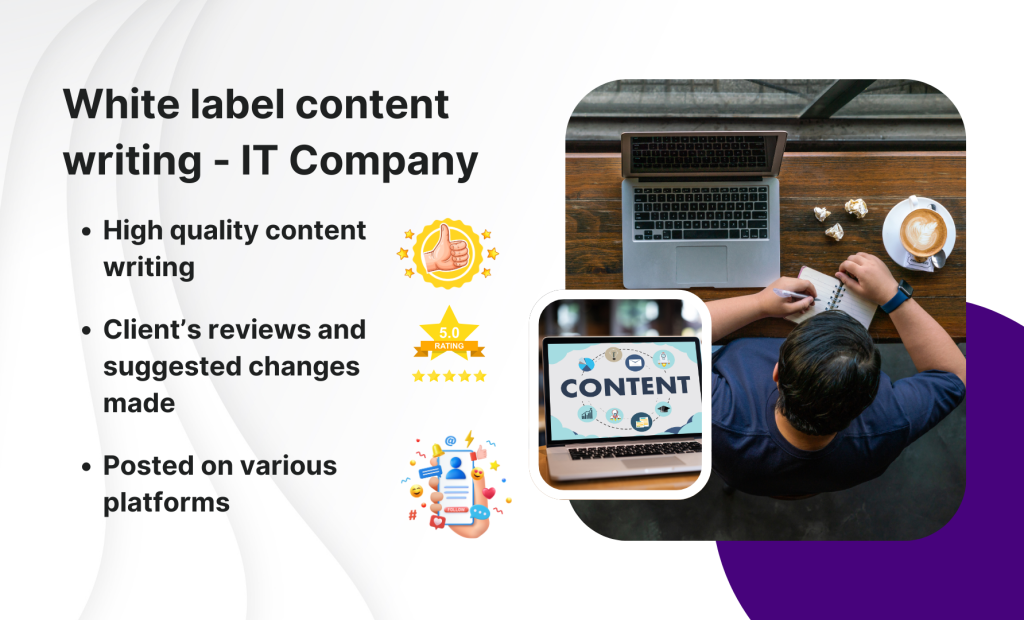
Table of Contents
ToggleIntroduction
In today’s digital age, content is king. Whether you run a small business or a large corporation, having high-quality, engaging content is essential for attracting and retaining customers.
However, creating content can be a time-consuming and challenging task, especially if you do not have the expertise or resources in-house. This is where white label content writing services come in.
What is White Label Content Writing?
White label content writing refers to a service offered by content writing agencies, where they create high-quality content for clients under their brand name. This means that the content is produced by the agency, but the client can present it as their own work without any reference to the original writer.
This approach allows businesses to outsource their content needs while maintaining a consistent brand image and voice. Furthermore, it allows businesses to outsource their content needs to professional writers who can create high-quality, SEO-friendly content that aligns with their brand voice and goals.
In addition to saving time and leveraging expertise, white label content writing can also help to enhance your brand credibility. By consistently publishing well-written and engaging content, you can position yourself as an authority in your industry and build trust with your audience. This can lead to increased brand awareness, website traffic, and conversions.
How Does a White Label Content Platform Work?
Here is a step-by-step process for ordering content from a white label service, integrating it with your agency’s workflow and branding, and ensuring quality control:
- Research and Select a White Label Service Provider:
- Begin by researching white label service providers that align with your agency’s needs. Look for reputable companies that offer the type of content you require (e.g., articles, graphics, videos).
- Evaluate their offerings, pricing, and quality standards.
- Customization and Branding:
- Once you have chosen a provider, discuss customization options. White label services often allow you to add your agency’s branding elements (logo, colors, fonts) to the content.
- Specify any additional customization requirements, such as tone, style, and formatting.
- Order Placement:
- Place an order with the white label service. Provide clear instructions, including the type of content, word count, topic, and any specific guidelines.
- If possible, set up an account or portal with the service provider for streamlined communication.
- Workflow Integration:
- Integrate the white label service into your agency’s workflow. This may involve creating a dedicated process for content orders.
- Assign responsibilities within your team (e.g., who handles order placement, review, and approval).
- Quality Control Measures:
- Establish quality control procedures:
- Review Process: Designate someone (or a team) to review the delivered content. Check for accuracy, relevance, and adherence to guidelines.
- Feedback Loop: Provide feedback to the white label service provider. Address any revisions or improvements needed.
- Performance Metrics: Set performance metrics (e.g., turnaround time, error rate) to evaluate the service provider’s performance.
- Delivery and Implementation:
- Once content is approved, integrate it into your agency’s projects (e.g., website, marketing materials, social media).
- Ensure consistent branding by using the customized content appropriately.
Remember to maintain open communication with the white label service provider throughout the process. Regularly assess their performance and adjust workflows as needed.
White Label Content Marketing Strategies
White label content offers a versatile approach to marketing, allowing brands to customize and distribute ready-made content as their own. It is an efficient strategy to enhance brand presence and authority without the time and resource investment typically required for content creation from scratch.

Repurposing content across various channels maximizes reach and engagement by adapting a single piece of content to suit different platforms. This strategy enhances online presence, ensures consistency in messaging, and leverages diverse media formats to cater to unique audience preferences, that boosts brand visibility and audience connection.
White label content, when executed effectively, can significantly boost brand visibility and authority. Success is measured by increased website traffic, higher search engine rankings, and enhanced customer engagement. The goal is to achieve a strong return on investment through content that resonates with the target audience and drives business growth.
When to Hire a White Label Content Marketing Agency
As agencies often find themselves at a crossroads when demand outpaces their internal capacity. This is where the strategic partnership with a white-label agency can be a meaningful change. Such collaborations bring in a wealth of specialized expertise and resources that are not only scalable but also customizable to fit the unique needs of the business.
By offloading content creation to a trusted partner, agencies can streamline their workflows, foster a more creative environment by tapping into external talent, and guarantee on-time delivery of high-quality content.

This not only ensures that the SEO agency maintains its reputation for excellence but also frees up internal resources to concentrate on core business strategies, driving growth and enhancing customer satisfaction. A white-label partnership is not just a support mechanism; it is a strategic move towards sustainable scalability and quality assurance in the ever-evolving content market.
White Label Content Writing Best Practices
Setting realistic goals and expectations is crucial for a successful white label content partnership. It involves creating a strategic content plan with clear guidelines to ensure alignment with brand values and objectives.
Best practices include
- Open communication
- Regular performance reviews
- Adapting strategies to meet evolving market demands
- Fostering a collaborative
- Productive relationship
White label Content Writing Template

The Pros and Cons of White Label Content Writing Services
| Advantages | Disadvantages |
| – Scalability: White label content writing services enable businesses to adjust their content volume quickly without the need for hiring or training new staff. | – Quality Concerns: There is a risk of content not meeting business standards due to the lack of direct management of the writers. |
| – Cost-Effectiveness: These services are often more affordable than maintaining an in-house writing team, as companies pay only for the content they need. | – Communication Challenges: Potential misunderstandings or delays can arise without direct interaction between the business and the writers. |
| – Diverse Expertise: Access to a wide range of writers with various backgrounds allows for high-quality content across different subjects | – Control Over Content: Businesses may experience less control over the content creation process, relying on the agency’s discretion for the final product. |
Conclusion:
White label content writing services enable businesses to outsource content creation while maintaining their brand identity. These services provide high-quality, SEO-optimized content that can be presented as the client’s own, enhancing brand credibility and authority.
By partnering with a reputable provider, business can save time, utilize professional expertise, and improve their online presence, leading to increased traffic and conversions. Consider leveraging these services to elevate your content strategy and drive business growth.
FAQ
Addressing concerns about quality, turnaround times, and pricing – Intellectual property and content ownership considerations